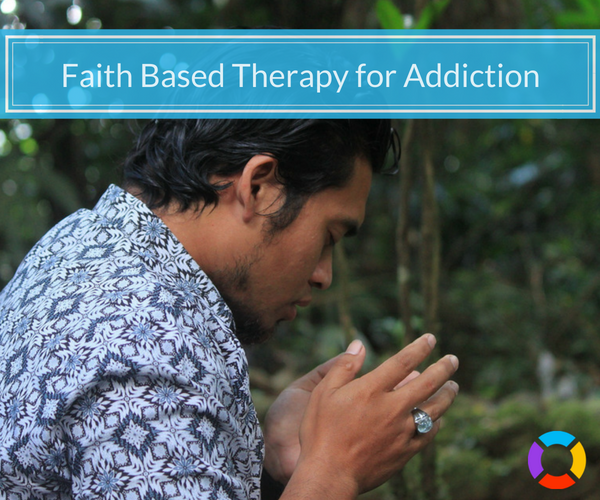Faith Based Therapy

Faith based therapy is an option for addiction treatment that many people prefer, especially those with strong faiths or religious backgrounds. This treatment option can add another layer of assistance in your path to stay sober. It can also help you get more in tune with your spiritual side. Not everyone will benefit from faith based substance abuse treatment programs, but many find great comfort in it.
Let us help you find detox and rehab centers for your recovery from drug dependence and addiction. Call 800-996-6135 now to get help today.
What Is Faith Based Therapy?
Faith based therapy is a recovery program that helps patients become more in tune with their faith and spirituality while helping them recover from addiction. There are many different faith based treatment facilities for recovery. There are also therapeutic programs that use faith and spirituality as part of their teachings.
Religious addiction treatment has been found to be one of the more effective options for recovery. These programs have also made great strides in reducing the homeless population and providing crisis counseling for those in need. This is why the Substance Abuse and Mental Health Services Administration is partnered with more than 800 of these facilities across the country.
How Does Faith Based Therapy Work?
According to a study in the medical journal Substance Use and Misuse, people often cite spirituality and faith as helpful influences in their recoveries. It was believed for many years that this was a coincidence or a factor that could not be measured. Over time, though, many researchers have found faith to be beneficial for those in recovery.
- Belief in a higher power helps patients feel more supported and less alone. They are able to give themselves over to that power and ask for forgiveness for their mistakes. This can be both cleansing and reassuring. One of the parts of 12-step facilitation therapy is surrender, which asks the patient to surrender to a higher power of their choice. This program prepares patients for 12-step meetings and membership and can be considered a type of faith based therapy.
- Connecting with one’s spiritual side can give one a better set of rules to live by. When these rules are rigid and clear, some people benefit from this influence. Those with this sort of structure are able to more easily avoid relapse.
- Believing in a higher power helps people be less selfish about their own desires, sacrifices, and problems. This belief makes it easier to recognize that many things would be at stake if you were to relapse.
- Those with fond memories of church or faith can often benefit from faith based therapy. These people often feel that their faith can help them get back on track after they have gone wrong.
Call now to find recovery programs that offer faith based therapy!
Faith Based Therapy Isn’t for Everyone
Some patients need treatment that does not focus on the moral implications of drug abuse or the black-and-white methodology of religion. This can make staying sober harder for some.
- You may not want to seek faith based therapy if you have had negative past experiences with religion, church groups, or spirituality in general. Some people simply do not find comfort or healing from this concept, and that’s okay.
- It can be harder for someone to turn to faith based therapy if they’ve never been involved in spiritual practices or church groups before. Those who have more experience with this type of thought process often fair better in these programs. However, many people can turn to faith for comfort and strength later in life and benefit from it.
The important thing to remember is that you should focus on your recovery and your own spiritual journey. If this type of treatment seems like it will positively affect you, then seek it out. If someone else is pushing you to seek faith based therapy, it probably won’t be as effective.
When Should Faith Based Substance Abuse Treatment Programs Start?
faith based substance abuse treatment programs can start as early as detox. Some detox centers offer patients prayers or meditations to work through their withdrawal symptoms. Many faith based facilities also provide medications. Some do not, however, so it’s important to consider the severity of your syndrome in order to decide if a non-medical detox program would be safe for you.
How Long Does Faith Based Therapy Last?
Many people attend faith based therapy programs for months, continuing the treatment from detox into rehab. Others may see a spiritual counselor for years afterward or even become part of faith based group therapy programs. 12-step programs like Alcoholics Anonymous and Narcotics Anonymous are based in the idea that surrendering to a higher power can help you avoid relapse. This higher power can be your concept of a god or another force of spiritual guidance.
Where Can I Find Faith Based Therapy & Religious Addiction Treatment?
Many faith based facilities exist all over the country, as do spiritual guides who offer faith based counseling. 12-step groups are another option. You should first seek out a professional detox and rehab program—faith based or not. Then you can continue into aftercare that provides religious addiction treatment from there.
Seek Safe, Effective Detox Treatment Today
We always want to help people who are looking for the safest, most effective detox program for their needs. Just call 800-996-6135 now to get help today. We can help you find local centers that offer faith based and traditional options.
Sources
- Substance Abuse and Mental Health Services Administration. (2018). About Faith-based and Community Initiatives.
- Substance Use and Misuse. (2010). A Focus-group Study on Spirituality and Substance-abuse Treatment.
- National Institute on Drug Abuse. (2018). Principles of Drug Addiction Treatment: A Research-Based Guide (Third Edition)- 12-Step Facilitation Therapy (Alcohol, Stimulants, Opiates).
- Alcoholics Anonymous World Services, Inc. (n.d.). What Is A.A.?

